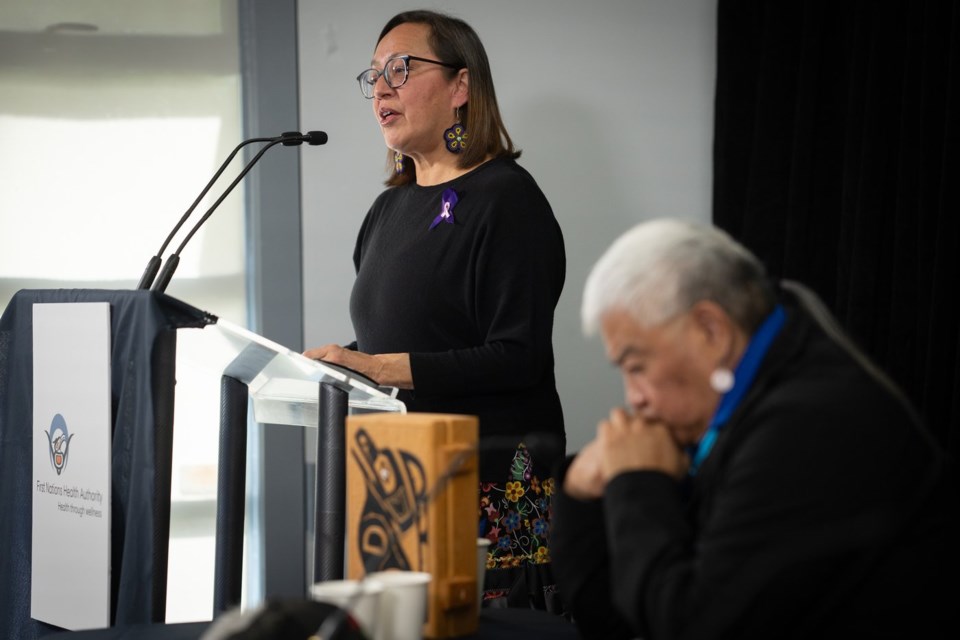WEST VANCOUVER — Deaths from toxic drugs may have dipped, but now is not the time to pull back on life-saving measures, especially given "misinformation" in the public discourse, the top doctor at British Columbia's First Nations Health Authority said Monday.
Dr. Nel Wieman said Indigenous Peoples continue to be disproportionately represented among the deaths as the province marked the ninth anniversary of the toxic drug crisis being declared a public health emergency on April 14, 2016.
Wieman said her team was pushing B.C.'s Health Ministry to help find a tailored approach for Indigenous-specific issues with the goal of preventing more people from dying and closing the gap with the non-Indigenous population.
Wieman presented data showing 427 Indigenous people in B.C. died of a toxic drug overdose last year, a 6.8 per cent decrease from 2023.
However, she said their death rate was still an average of 6.7 times higher than other B.C. residents.
"This is the largest gap we have seen between First Nations and other residents in toxic drug deaths since 2016, when the public health emergency was declared," she told a news conference.
While First Nations people make up about 3.4 per cent of B.C.'s population, she said they represented 19 per cent of toxic drug deaths last year.
First Nations women were especially overrepresented, dying at a rate 11.6 times higher than other female residents in 2024, while First Nations men died at a rate 5.2 times higher than other men in the province.
Still, Wieman said the latest figures also show that harm-reduction measures are helping to slow the number of deaths.
Working with the BC Centre for Disease Control, she said the health authority undertook an analysis that estimated that the measures, such as overdose prevention sites and take-home naloxone kits, had prevented at least 1,024 potential deaths between 2018 and 2022.
"Now is not the time to walk back on harm reduction, especially for a population that is overrepresented," Wieman said.
"We know anti-First Nations racism is rife in all of the systems, not just the health system, but all of the systems that impact people who are trying to either stabilize or improve their lives."
Wieman said the B.C. government, coroners' service, researchers and others must also stand against the "disinformation and harmful rhetoric" circulating in the public discourse about the crisis and harm-reduction measures aimed at saving lives.
She noted the province's decriminalization initiative had been "really important" for Indigenous Peoples, who tend to be overrepresented in the criminal justice system.
The possession of small amounts of certain illicit substances for personal use was decriminalized in B.C. in January 2023, but the province curtailed the program last May, limiting its scope to private homes, shelters, overdose prevention and drug-checking sites as well as outpatient addiction facilities.
"The whole point of decriminalization was to try to take some of the stigma away from people who use substances," Wieman said, adding it was aimed at transforming substance use to a "health problem" rather than an issue for the justice system.
"It has been frustrating to see that narrative be taken away and hear people say phrases like, 'now that all drugs are legal in this province.' That is certainly not the case," Wieman said.
The toxic drug crisis has claimed more than 16,000 lives in B.C. since the public health emergency was declared.
B.C. provincial health officer Dr. Bonnie Henry said there have been some "glimmers of hope" with the death rate declining over the last year, but there is much more to do to ensure people have the supports they need.
"Whether it is being able to have a conversation with a trusted loved one, peer or medical worker, access to life-saving naloxone, or a safe place to have drugs tested, we have seen how these harm-reduction measures make a difference and save lives," she said in a statement issued Monday.
"But the increasing toxicity and unpredictability of the drugs on the street also remind us that we must continue to have the courage to be innovative and unwavering in our approach to this public health crisis. The very lives of our brothers, sisters, friends, neighbours and colleagues depend on it."
B.C. Health Minister Josie Osborne said each death from a toxic drug overdose leaves lasting grief for that person's loved ones and friends.
"On this solemn anniversary, we renew our commitment to saving lives, supporting healing and working together to turn the tide on this crisis," she said. "By reducing stigma, improving access to care and meeting people where they're at, we can help more people find their path to recovery and build a future filled with hope."
There are many complex factors shaping substance use, including trauma, mental and physical health challenges, poverty, stigma and barriers to securing stable housing and other supports, the minister said in the statement issued Monday.
"Ending this crisis requires an equally complex and compassionate response, one that prioritizes care over judgment," Osborne said.
This report by The Canadian Press was first published April 14, 2025.
Brenna Owen, The Canadian Press



